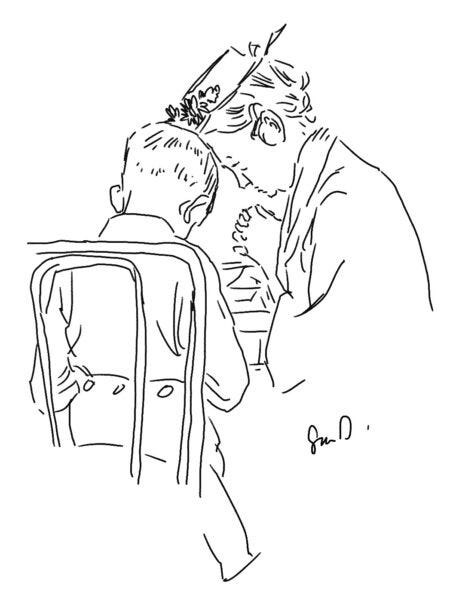Whenever I am feeling sad and blue, I visit my living room coffee table. I sit on my sofa, which is adorned with chew toys, claw marks, canine hair, exposed couch stuffing, and various upholstery springs, and petrified trails of dog drool that resemble evidence of past slug races.
There, I consult a book that sits on my coffee table. I open this book and almost always feel better.
I consult this book whenever life starts to feel heavy. Whenever people in the world seem particularly bat-excrement insane. Whenever my fellow Americans become uncharitable, arrogant, selfish, or worse, political.
That’s where this book comes in handy.
Inside this book are famous paintings. Most of these paintings were originally covers for the “Saturday Evening Post” magazine.
The first painting in this book is entitled “Before the Shot” (1958). The painting shows a little boy, in a doctor’s office. The boy is unfastening his pants, getting ready for a shot, and his little white butt is showing. Meanwhile, the doctor is by the window, preparing the syringe. The painting makes you smile, no matter who you are. Especially if you’ve ever had a little white butt of your own at one time.
There is the series of paintings about “Willie Gillis.” From 1941 to 1946, the Post ran covers about a fictional character named Willie, a freckle-faced young man who was swept away into the madness of World War II.
Willie begins as a boy. Then he enters the military, wide-eyed and hopeful. Throughout a series of mostly lighthearted images, we see the war change Willie. When he comes back home, he’s looks less optimistic. And there’s something deeply moving about this change in him over five years of hell.
There is the artist’s depiction of “Rosie the Riveter” (1943). She embodies the post-Depression, wartime, hardworking blue-collar woman. She is proud, brawny, holding her sandwich, with a rivet gun slung across herself. Her pose is Renaissance. Her beauty is classical. Her current profession, ironic. Rosie is based on Michelangelo’s 1509 painting of “The Prophet Isaiah.” Almost an exact anatomical replica.
There’s the painting “Saying Grace” (1951). Maybe my favorite in the whole book. Maybe of all time.
The painting shows a bustling café, filled with people. The café customers are down-and-outers. All shoving in mouthfuls of food before heading off to work.
Outside the window is a big city, with industrial smokestacks. At a lone table, a mother and son are giving thanks for meager meals.
Across their table are two street toughs. The young men are watching mother and child with great curiosity. A cigarette hangs from the corner of one young man’s mouth as he lowers his newspaper to get a better look at them.
The boy and mother have hands folded. Heads bowed. Blissfully unaware of their surroundings. As they offer thanks to God for their food.
The painting was inspired by a reader of the “Saturday Evening Post,” who once observed a Mennonite family, in the 1940s, saying grace in a public restaurant. The artist read this letter and was so moved, that he based a painting on it.
And this painting still affects me today. Deeply, and I don’t know why. I can’t put my finger on it. But it makes me feel grateful.
In fact, after spending only a few minutes looking through these pages, I usually close the book and sigh with a bittersweet smile on my face.
Then I say aloud, “Thank you, Norman Rockwell.”
Not only for the art. But for changing the way I choose to see this world.






I’ve said this before, but you, Sean, are our Norman Rockwell in words. And for that, we are so very thankful.
It was a different world. And your memories and imagining it all much better then only gets stronger as you age. I never imagined a world I did not understand. I was always on top of things with technology and slang. Now with AI, crypto and seeing people banking on their phone and a thousand other things I am beginning to feel lost. So, like you, I look at images of the past in my mind or other places. It was safer and less complicated. But the past had its problems for many people. People not like you and I. I want to talk to my dad, and my grandparents to my cousins. I look at my kids, especially my 18 yr old daughter, and know she will want to talk to me one day when she cannot. Thankfully, we talk all the time. Norman Rockwell evokes that much simpler world. I recently read Charles Schultz biography. Nothing makes me think of the past like him. I grew up with Charlie and Snoopy and Linus. Ok, I have wandered into the wilderness here. Sorry.....I have seen that book. It is wonderful. We miss that time. We missed you for a few days. We love you, Sean. You remind us that we are all human and need to treat each other as such.